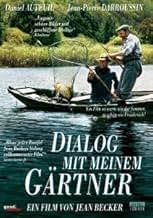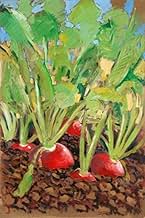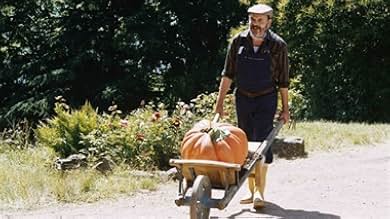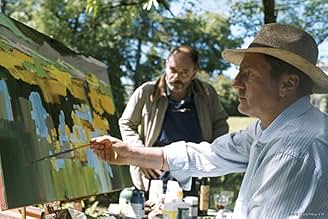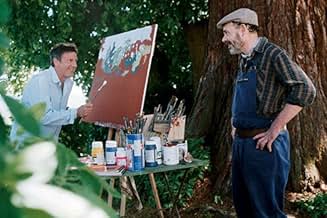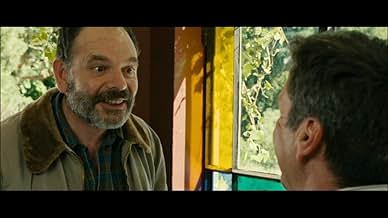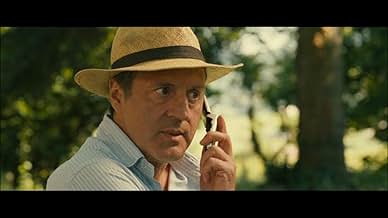Dialogue avec mon jardinier
- 2007
- 1h 49min
CALIFICACIÓN DE IMDb
7.1/10
3.9 k
TU CALIFICACIÓN
Un artista de éxito, cansado de la vida parisina y al borde del divorcio, regresa a la casa familiar en la campiña.Un artista de éxito, cansado de la vida parisina y al borde del divorcio, regresa a la casa familiar en la campiña.Un artista de éxito, cansado de la vida parisina y al borde del divorcio, regresa a la casa familiar en la campiña.
- Dirección
- Guionistas
- Elenco
- Premios
- 1 premio ganado y 2 nominaciones en total
Elric Thomas
- Le dentiste
- (as Eric Thomas)
Mickey Dedaj
- Ambulancier 1
- (as Micky Dedaj)
Stephane Kordylas
- Ambulancier 2
- (as Stéphane Kordylas)
Opiniones destacadas
Jean Becker makes extremely typical french films, with lots of dialog, and masterful mise en scene. This film plays again with one of his favorite subjects, the wisdom of the uncultivated, working class simpletons, as opposed to the stiff way of life of the cultivated bourgeoisie. More or less. The story, a painter who goes back to the village of his childhood and befriends a retired railroad worker he hires as gardener ad happens to be an old childhood friend, serves well as an excuse for a series of enlightening dialogs and thoughts over class, life, struggle, love, etc. When it ends you have been entertained brilliantly for 90 minutes, and you are also left with something to think about.
For a while, this admittedly talky film (the title is quite accurate, it is mostly conversations) bored me a bit. While the two actors are terrific, the stakes didn't seem very high, and some of the talk seemed too 'easy' in it's wisdom; the working class gardener imparting what's really important in life to the upper-class artist. Not a new concept.
But this is one of those films that gains it's power by accumulation, and by the end of the film, when life has intervened in more dramatic ways, as it inevitably does, I found myself quite touched, if not deeply moved, and looking back on the whole experience of the film with a wistful fondness.
But this is one of those films that gains it's power by accumulation, and by the end of the film, when life has intervened in more dramatic ways, as it inevitably does, I found myself quite touched, if not deeply moved, and looking back on the whole experience of the film with a wistful fondness.
Suppose another civil war broke out in France some day, well, Jean Becker might start it! Indeed because of him the country is now divided into two fratricidal sides: the spectators and the critics! As for the spectators, they flock to Jacques Becker's son's films and invariably love all he has done from "les Enfants du Marais" (1998). I personally -just like everybody else except the critics - have been amused and touched by the aforementioned movie as well as "Un crime au Paradis", "Effroyables Jardins" and his latest opus "Dialogue avec mon Jardinier". Simple but not simplistic, moving without being overly sentimental, humane but not populist, Jean Becker's last picture talks directly to the heart .On the other side you have the critics. This happy few are beside themselves with a man who dares show ordinary unaffected characters rather than Paris intellectuals between themselves, who tries to make our daily lives better rather than denigrate all the values not deemed valid by their highbrow circle. But let the civil war start: we spectators outnumber the critics by far. They are bound to be defeated!
As is always the case with Becker's recent movies, the story is very simple, not depending on plot twists or dramatic ups and downs to exist. However if you read the eponymous book (by Henri Cueco) which inspired the film, you will realize that the adaptation work (by talented Jean Cosmos) was no pleasure cruise. The title of Cueco's book ("Dialogue avec mon Jardinier") is telling in this respect: It has no storyline to speak of. It all amounts to a conversation between a Paris artist and his local gardener at the former's family house. Even more difficult, in the text, consisting mainly in the gardener's replies, there is no such thing as a real dialogue. You actually get to know the artist through the gardener's answers. How anti cinematographic! A carbon copy was impossible and Cosmos set about bringing on a few changes. Of course, he fleshed out the painter's character, modified a few facts (the artist is on the verge of divorce, he has a daughter about to marry, the circle of artists he used to mix with is described and satirize - hence the critics' reaction! - ; the gardener has become the artist's childhood friend, he does not a have a young daughter ) and created a subplot (concerning mostly the relationships between the artist, his separated wife and his young adult daughter). This way, although there is not much action other than an evolution in the characters' minds and feelings, "Dialogue avec mon Jardinier" functions as a true film, with a beginning, a middle and an end. But what is the most remarkable is that the dialogue of the book is transposed in full, with only a few minor additions or deletions. Such wonderful work allows Becker's last movie to attract the viewer while remaining faithful to the spirit of Cueco's original work: a sophisticated artist learns the basics of life while a John Doe is introduced to a world that totally escaped him before and enrich their minds mutually as a result.
The text is served by two outstanding actors, Daniel Auteuil (as subtle and humane as he can be) and Jean-Pierre Darroussin (absolutely amazing as the down-to-earth but not common gardener).
When you leave the theater you feel peaceful and happy despite the heart-breaking ending. It is the (French) critics' loss if they make all the efforts in the world to dislike such a beautiful film.
As is always the case with Becker's recent movies, the story is very simple, not depending on plot twists or dramatic ups and downs to exist. However if you read the eponymous book (by Henri Cueco) which inspired the film, you will realize that the adaptation work (by talented Jean Cosmos) was no pleasure cruise. The title of Cueco's book ("Dialogue avec mon Jardinier") is telling in this respect: It has no storyline to speak of. It all amounts to a conversation between a Paris artist and his local gardener at the former's family house. Even more difficult, in the text, consisting mainly in the gardener's replies, there is no such thing as a real dialogue. You actually get to know the artist through the gardener's answers. How anti cinematographic! A carbon copy was impossible and Cosmos set about bringing on a few changes. Of course, he fleshed out the painter's character, modified a few facts (the artist is on the verge of divorce, he has a daughter about to marry, the circle of artists he used to mix with is described and satirize - hence the critics' reaction! - ; the gardener has become the artist's childhood friend, he does not a have a young daughter ) and created a subplot (concerning mostly the relationships between the artist, his separated wife and his young adult daughter). This way, although there is not much action other than an evolution in the characters' minds and feelings, "Dialogue avec mon Jardinier" functions as a true film, with a beginning, a middle and an end. But what is the most remarkable is that the dialogue of the book is transposed in full, with only a few minor additions or deletions. Such wonderful work allows Becker's last movie to attract the viewer while remaining faithful to the spirit of Cueco's original work: a sophisticated artist learns the basics of life while a John Doe is introduced to a world that totally escaped him before and enrich their minds mutually as a result.
The text is served by two outstanding actors, Daniel Auteuil (as subtle and humane as he can be) and Jean-Pierre Darroussin (absolutely amazing as the down-to-earth but not common gardener).
When you leave the theater you feel peaceful and happy despite the heart-breaking ending. It is the (French) critics' loss if they make all the efforts in the world to dislike such a beautiful film.
Internationally known as "Conversations with My Gardener" this film deals with an artist that moves back to his small country side village of birth after living in the hectic and fast paced Paris for a good number of years. He is still married but divorce is on the way and is in desperate need of a change.
Once back on the country side he hires a gardener to work his garden while he works his art and as it turns out the gardener is a childhood friend of his that has been living in the village his whole life. When the two meet again they start reliving old memories and conversing about just about everything and inspiring each other in many ways, both learning something they had long since forgotten.
Beautiful imagery, nice mellow music, realism. But above all, a sparkling unity between the two main characters. With that the film has all the ingredients to be a great film. It falters on only a few spots and IMO the one place where it really fails is by taking a very often used cliché to add some events to the ending that work toward a quicker ending but toward nothing else.
8 out of 10 long talks on a midsummer night
Once back on the country side he hires a gardener to work his garden while he works his art and as it turns out the gardener is a childhood friend of his that has been living in the village his whole life. When the two meet again they start reliving old memories and conversing about just about everything and inspiring each other in many ways, both learning something they had long since forgotten.
Beautiful imagery, nice mellow music, realism. But above all, a sparkling unity between the two main characters. With that the film has all the ingredients to be a great film. It falters on only a few spots and IMO the one place where it really fails is by taking a very often used cliché to add some events to the ending that work toward a quicker ending but toward nothing else.
8 out of 10 long talks on a midsummer night
I read about this movie, and so deeply interested about the story line that I had to go and watch this flick. I do not understand French, nor the Dutch sub-titles. What I did was tried to search for sub-titles in English on the internet. Could not find one, so downloaded the sub-titles in Spanish, translated them to English and read the whole script of sub-titles before going for the movie. Surely it did not make much sense, but I depended on my memory to recollect the discussions between the painter and the gardener. Coming back home, I again re-read the sub-title script and recollected the images. That is how I saw and understood the movie. Though silly, that was the only and my way of doing enjoying this masterpiece.
The story is simple a famous painter Dupinceau (Daniel Auteuil) is fed up with life in Paris and has decided to move back to his village home to paint. He hires a gardener Dujardin (Jean-Pierre Darroussin) who turns out to me school class mate. A whole lifetime has passed from where they started at school remembering a prank the students played on their teacher's birthday cake. They share their journey of life with each other through casual talks. The painter and gardener both experts in their fields are unique, in their perception of seeing things and understanding. Both of them become close friends and with ailing health of gardener, the painter takes him to Paris for treatment. A few years later when the gardener dies, the painter fulfills his wishes by drawing the common things of his gardener's life to capture those memories of happiness and joys.
The simplicity of plot and the depth of discussion is so appealing that one fills fulfilled by just listening the gardener and painter talk you wish their talk would never end. This inspiring interest is created by Daniel and Jen-Pierre in living their roles perfectly on screen.
Seventy year old Director Jean Becker, who has also partly written the story takes us through this varied journey of life's mysteries without letting us know that.
The innocent wittiness of gardener's amazement and questions posed to the painter are the highlight of the movie that bring enlightenment of seeing things differently for painter and also for us.
The background musical score is spare, but wherever it is used, it is effective. There are a few sub-plots, but the movie does not digress from the main theme, and kudos to that track.
The most moving scene for me was when the two friends go for fishing, catch a big fish and then leave it back in the water alive and free again. Wonderful! There are so many dialogues in questions, answers and casual exchanges that resonate with our souls. The last words of the gardener would ring in our hearts for years I would like that you painted something that I liked. And in the end - the painter does A classic, not to be missed only recommended for those who are willing to know their souls (Stars 7.25 out fo 10)
The story is simple a famous painter Dupinceau (Daniel Auteuil) is fed up with life in Paris and has decided to move back to his village home to paint. He hires a gardener Dujardin (Jean-Pierre Darroussin) who turns out to me school class mate. A whole lifetime has passed from where they started at school remembering a prank the students played on their teacher's birthday cake. They share their journey of life with each other through casual talks. The painter and gardener both experts in their fields are unique, in their perception of seeing things and understanding. Both of them become close friends and with ailing health of gardener, the painter takes him to Paris for treatment. A few years later when the gardener dies, the painter fulfills his wishes by drawing the common things of his gardener's life to capture those memories of happiness and joys.
The simplicity of plot and the depth of discussion is so appealing that one fills fulfilled by just listening the gardener and painter talk you wish their talk would never end. This inspiring interest is created by Daniel and Jen-Pierre in living their roles perfectly on screen.
Seventy year old Director Jean Becker, who has also partly written the story takes us through this varied journey of life's mysteries without letting us know that.
The innocent wittiness of gardener's amazement and questions posed to the painter are the highlight of the movie that bring enlightenment of seeing things differently for painter and also for us.
The background musical score is spare, but wherever it is used, it is effective. There are a few sub-plots, but the movie does not digress from the main theme, and kudos to that track.
The most moving scene for me was when the two friends go for fishing, catch a big fish and then leave it back in the water alive and free again. Wonderful! There are so many dialogues in questions, answers and casual exchanges that resonate with our souls. The last words of the gardener would ring in our hearts for years I would like that you painted something that I liked. And in the end - the painter does A classic, not to be missed only recommended for those who are willing to know their souls (Stars 7.25 out fo 10)
¿Sabías que…?
- Citas
Le jardinier Léo dit Dujardin: Always carry a knife and a piece of string. They can be a life saver.
- ConexionesFeatured in Les Coulisses du Jardin (2007)
- Bandas sonorasConcerto pour clarinette
Composed by Wolfgang Amadeus Mozart
Selecciones populares
Inicia sesión para calificar y agrega a la lista de videos para obtener recomendaciones personalizadas
Detalles
- Fecha de lanzamiento
- País de origen
- Sitios oficiales
- Idioma
- También se conoce como
- Conversations with My Gardener
- Locaciones de filmación
- Musée de l'Education du Val-d'Oise, 2 place des Ecoles, Val-d'Oise, Francia(two kids explode a firecracker in a flashback scene)
- Productoras
- Ver más créditos de la compañía en IMDbPro
Taquilla
- Total a nivel mundial
- USD 15,217,960
Contribuir a esta página
Sugiere una edición o agrega el contenido que falta

Principales brechas de datos
What is the English language plot outline for Dialogue avec mon jardinier (2007)?
Responda
